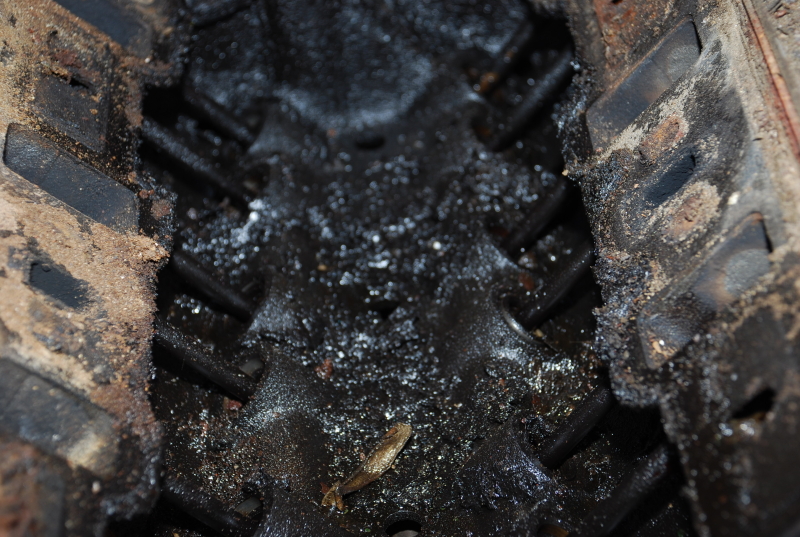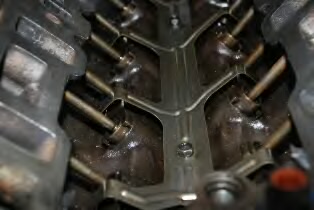This is a list from Amsoil of engines prone to sludge.
"The engines identified in the following chart have
been reported to be prone to sludge. [End quote]
^^^^^^^^^^
For Audi/Volkswagen (L stands for Liter):
1.8 L 4-cylinder Turbo
Automobile Models and Years:
1997 - 2004 A4
1998 - 2004 Passat
New Warranty Coverage: 8 years / unlimited mileage (I guess
Audi/Volkswagen voluntarily extended the warranty for the sludger.)
Oil drain intervals for warranty coverage:
5,000 miles / 6 months (normal/severe)
^^^^^^^^^^^^^^^^^^^
For Chrysler/Dodge:
2.7 L V6
Automobile models and years:
1998-2002 Concorde
1998-2002 Sebring
1998-2002 Intrepid
1998-2002 Stratus
New Warranty Coverage: None, handled on a case-by-case
basis (Not as nice as the Audi/VW deal above)
Oil drain intervals for warranty coverage:
3,000 miles/three months (severe)
5,000 miles/six months (normal)
^^^^^^^^^^^^^^^^^^^
For Dodge/Jeep:
3.9 L V6
5.2 L V8
5.9 L V8
Models and years:
1994-1999 Ram Truck
1994-1999 Ram Van
1994-1999 Dakota
1994-1999 Durango
1994-1999 Grand Cherokee
New Warranty Coverage: None, handled on a case-by-case
basis.
Oil drain intervals for warranty coverage:
3,000 miles/three months (severe)
5,000 miles/six months (normal)
^^^^^^^^^^^^^^^^^^^
For Lexus/Toyota:
2.2 L 4-cylinder ( 5S-FE )
Models and years:
1997-2001 Camry
1997-2001 Solara
1997-1999 Celica
New Warranty Coverage: 8 years / unlimited mileage.
Oil drain intervals for warranty coverage:
5,000 miles/four months (severe)
7,500 miles (normal)
^^^^^^^^^^^^^^^^^^^
There's a second engine for Lexus/Toyota:
3.0 L V6 ( 1MZ ) [Actually "IMZ" appears, but the "I"
must be a misprint. It's gotta be 1MZ.]
Models and years:
1997-2002 Camry
1999-2002 Solara
1998-2002 Sienna
1997-2002 Avalon
2001-2002 Highlander
Same warranty coverage and oil drain intervals as the first
Toyota engine above.
Sidenote: The 3.0 Liter V6 1MZ engine was used in some 2006
Camrys, so I don't know why the '06 model year doesn't appear
in the list above. The Amsoil document is copyrighted 2008,
so it shouldn't be a matter of old information. Was the sludge
problem somehow fixed in the 1MZ after 2002 ?
^^^^^^^^^^^^^^^^^^^
For Saab:
2.0 L 4-cylinder Turbo
Models and years:
2000-2002 9-3 Hatchback
2000-2003 9-3 Convertible
Another Saab engine: 2.3 L 4-cylinder Turbo
Models and years:
1999-2003 9-5
1999-2003 Viggen
New Warranty Coverage: 8 years / unlimited mileage
Oil drain intervals for warranty coverage:
5,000 miles/4 months (severe)
10,000 miles (normal)
000000000000000000000000000000000000000000000000000000000
The Amsoil document lists its sources for the above info as
Audi of America's warranty extension letter, Volkswagen of America's
warranty extension letter, AutoSafety.Org copy of Toyota notification
letter, and Saab Cars USA special warranty coverage letter. Amsoil's
source for the Chrysler/Dodge information is ConsumerReports.Org and
the source for Dodge/Jeep info is a Chrysler TSB 09-05-00 (I guess
this is a Technical Service Bulletin issued by Chrysler on 9/5/2000).
Finally, Amsoil got the info for the oil drain intervals to meet
warranty coverage from "2005 Car Care Guide" put out by Motor
Information Systems.
Here's a link to the .pdf file:
http://www.amsoil.com/lit/g1490.pdf
"The engines identified in the following chart have
been reported to be prone to sludge. [End quote]
^^^^^^^^^^
For Audi/Volkswagen (L stands for Liter):
1.8 L 4-cylinder Turbo
Automobile Models and Years:
1997 - 2004 A4
1998 - 2004 Passat
New Warranty Coverage: 8 years / unlimited mileage (I guess
Audi/Volkswagen voluntarily extended the warranty for the sludger.)
Oil drain intervals for warranty coverage:
5,000 miles / 6 months (normal/severe)
^^^^^^^^^^^^^^^^^^^
For Chrysler/Dodge:
2.7 L V6
Automobile models and years:
1998-2002 Concorde
1998-2002 Sebring
1998-2002 Intrepid
1998-2002 Stratus
New Warranty Coverage: None, handled on a case-by-case
basis (Not as nice as the Audi/VW deal above)
Oil drain intervals for warranty coverage:
3,000 miles/three months (severe)
5,000 miles/six months (normal)
^^^^^^^^^^^^^^^^^^^
For Dodge/Jeep:
3.9 L V6
5.2 L V8
5.9 L V8
Models and years:
1994-1999 Ram Truck
1994-1999 Ram Van
1994-1999 Dakota
1994-1999 Durango
1994-1999 Grand Cherokee
New Warranty Coverage: None, handled on a case-by-case
basis.
Oil drain intervals for warranty coverage:
3,000 miles/three months (severe)
5,000 miles/six months (normal)
^^^^^^^^^^^^^^^^^^^
For Lexus/Toyota:
2.2 L 4-cylinder ( 5S-FE )
Models and years:
1997-2001 Camry
1997-2001 Solara
1997-1999 Celica
New Warranty Coverage: 8 years / unlimited mileage.
Oil drain intervals for warranty coverage:
5,000 miles/four months (severe)
7,500 miles (normal)
^^^^^^^^^^^^^^^^^^^
There's a second engine for Lexus/Toyota:
3.0 L V6 ( 1MZ ) [Actually "IMZ" appears, but the "I"
must be a misprint. It's gotta be 1MZ.]
Models and years:
1997-2002 Camry
1999-2002 Solara
1998-2002 Sienna
1997-2002 Avalon
2001-2002 Highlander
Same warranty coverage and oil drain intervals as the first
Toyota engine above.
Sidenote: The 3.0 Liter V6 1MZ engine was used in some 2006
Camrys, so I don't know why the '06 model year doesn't appear
in the list above. The Amsoil document is copyrighted 2008,
so it shouldn't be a matter of old information. Was the sludge
problem somehow fixed in the 1MZ after 2002 ?
^^^^^^^^^^^^^^^^^^^
For Saab:
2.0 L 4-cylinder Turbo
Models and years:
2000-2002 9-3 Hatchback
2000-2003 9-3 Convertible
Another Saab engine: 2.3 L 4-cylinder Turbo
Models and years:
1999-2003 9-5
1999-2003 Viggen
New Warranty Coverage: 8 years / unlimited mileage
Oil drain intervals for warranty coverage:
5,000 miles/4 months (severe)
10,000 miles (normal)
000000000000000000000000000000000000000000000000000000000
The Amsoil document lists its sources for the above info as
Audi of America's warranty extension letter, Volkswagen of America's
warranty extension letter, AutoSafety.Org copy of Toyota notification
letter, and Saab Cars USA special warranty coverage letter. Amsoil's
source for the Chrysler/Dodge information is ConsumerReports.Org and
the source for Dodge/Jeep info is a Chrysler TSB 09-05-00 (I guess
this is a Technical Service Bulletin issued by Chrysler on 9/5/2000).
Finally, Amsoil got the info for the oil drain intervals to meet
warranty coverage from "2005 Car Care Guide" put out by Motor
Information Systems.
Here's a link to the .pdf file:
http://www.amsoil.com/lit/g1490.pdf





